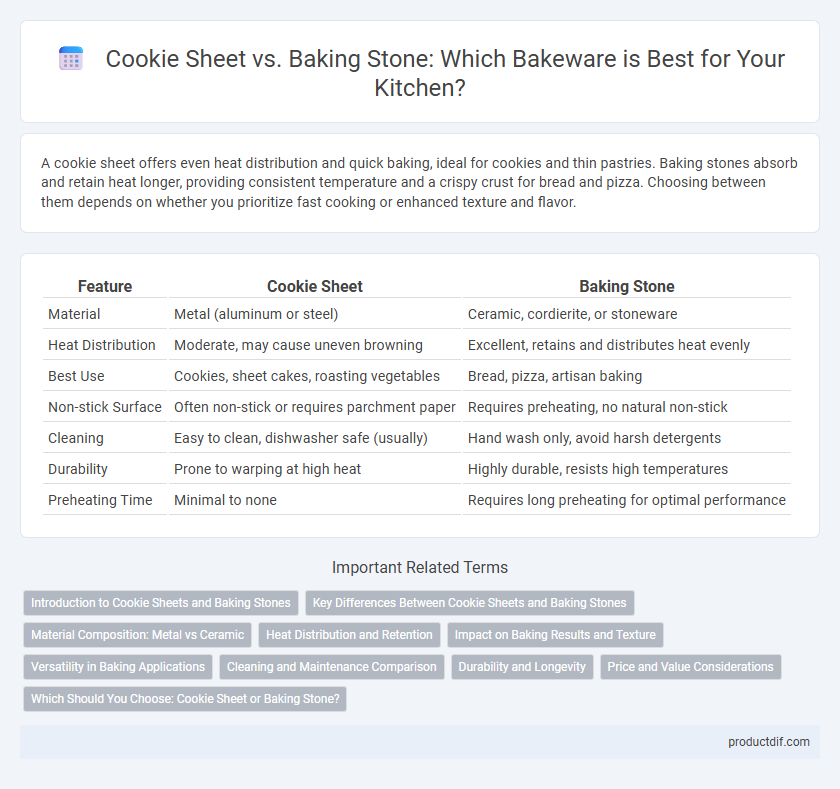A cookie sheet offers even heat distribution and quick baking, ideal for cookies and thin pastries. Baking stones absorb and retain heat longer, providing consistent temperature and a crispy crust for bread and pizza. Choosing between them depends on whether you prioritize fast cooking or enhanced texture and flavor.
Table of Comparison
| Feature | Cookie Sheet | Baking Stone |
|---|---|---|
| Material | Metal (aluminum or steel) | Ceramic, cordierite, or stoneware |
| Heat Distribution | Moderate, may cause uneven browning | Excellent, retains and distributes heat evenly |
| Best Use | Cookies, sheet cakes, roasting vegetables | Bread, pizza, artisan baking |
| Non-stick Surface | Often non-stick or requires parchment paper | Requires preheating, no natural non-stick |
| Cleaning | Easy to clean, dishwasher safe (usually) | Hand wash only, avoid harsh detergents |
| Durability | Prone to warping at high heat | Highly durable, resists high temperatures |
| Preheating Time | Minimal to none | Requires long preheating for optimal performance |
Introduction to Cookie Sheets and Baking Stones
Cookie sheets are flat, rectangular metal pans designed for even heat distribution and easy removal of baked goods, making them ideal for cookies and biscuits. Baking stones, often made of ceramic or cordierite, absorb and retain heat to create a consistent baking surface, mimicking the effects of a brick oven. Both tools enhance baking results, but cookie sheets prioritize quick heat conduction while baking stones offer steady, radiant heat.
Key Differences Between Cookie Sheets and Baking Stones
Cookie sheets provide even heat distribution with a metal surface ideal for crispy edges and quick baking times, while baking stones offer superior heat retention and moisture absorption, resulting in evenly baked goods with a more natural crust. Cookie sheets typically have a raised edge to contain dough and facilitate handling, whereas baking stones are flat, requiring parchment paper or silicone mats to prevent sticking. The choice between the two depends on the desired texture and baking style, with cookie sheets favored for cookies and baking stones preferred for bread and pizza.
Material Composition: Metal vs Ceramic
Cookie sheets are typically made from aluminum or steel, offering excellent heat conduction for even baking and quick temperature response. Baking stones, composed of ceramic materials like cordierite or clay, provide superior heat retention and distribute heat more evenly, resulting in a crispier crust. The difference in material composition directly affects baking performance, with metal sheets favored for fast, consistent heat and ceramic stones ideal for slow, uniform heat absorption.
Heat Distribution and Retention
Cookie sheets typically offer more direct heat conduction due to their thin metal construction, ensuring quicker and more even browning of cookies. Baking stones excel in heat retention, absorbing and radiating heat steadily, which helps maintain consistent oven temperature and prevents hot spots. The choice between cookie sheet and baking stone impacts the texture and baking time, with cookie sheets favoring crisp edges and baking stones promoting uniform cooking.
Impact on Baking Results and Texture
Cookie sheets provide even heat distribution and a flat surface, resulting in crisp edges and uniform browning for cookies. Baking stones absorb and retain heat evenly, creating consistent temperature and moisture reduction that yields chewier textures with a slightly crisp exterior. The choice between the two directly influences cookie texture, with cookie sheets favoring crispness and baking stones promoting a denser, more artisanal finish.
Versatility in Baking Applications
Cookie sheets offer versatility by accommodating a wide range of baked goods, from cookies to sheet cakes, with their non-stick surfaces promoting even baking and easy release. Baking stones excel in creating crispy crusts for bread and pizzas by evenly distributing heat and absorbing moisture, making them ideal for artisan baking. Choosing between the two depends on whether you prioritize quick, diverse baking tasks or specialized, heat-retentive cooking for specific recipes.
Cleaning and Maintenance Comparison
Cookie sheets are typically made from metal and feature a nonstick coating, making them easy to clean with warm soapy water and a soft sponge to prevent scratches. Baking stones, usually composed of ceramic or cordierite, require special care involving gentle hand washing without soap to maintain their porous surface and avoid residue absorption. Proper maintenance of baking stones includes regular drying and occasional seasoning to prevent cracks, while cookie sheets demand less frequent upkeep and are dishwasher safe in most cases.
Durability and Longevity
Cookie sheets, typically made from aluminum or steel, offer good durability but may warp over time with frequent high-temperature use. Baking stones, commonly crafted from ceramic or cordierite, are highly durable and designed to withstand intense heat without cracking, ensuring long-term performance. The choice between a cookie sheet and baking stone ultimately affects longevity, with baking stones generally providing superior resistance to wear and maintaining consistent heat distribution over years of use.
Price and Value Considerations
Cookie sheets typically cost between $10 and $30, offering an affordable and versatile option for everyday baking needs. Baking stones range from $20 to $60, providing superior heat retention and even cooking but at a higher initial investment. The choice depends on budget constraints and the value placed on baking performance and durability.
Which Should You Choose: Cookie Sheet or Baking Stone?
A cookie sheet offers even heat distribution and easy release for crisp, evenly baked cookies, while a baking stone absorbs moisture and retains heat to create a crispier crust, ideal for artisan-style cookies and bread. Choose a cookie sheet for quick, uniform baking with minimal cleanup or a baking stone for enhanced texture and a professional finish. The decision depends on your baking style, preferred cookie texture, and convenience priorities.
Cookie Sheet vs Baking Stone Infographic

 productdif.com
productdif.com